Several million rugby tourists are making their plans to be in Australia. A British and Irish Lions series kicks off only 13 Wallaby Tests from now. A World Cup follows that epic after a few Bledisloes.
Rugby Australia has an enfant terrible, a big baby with money, in the board chair, every utterance dripping with melodrama; but no coach, no assistants, no true CEO, no funding, and no quarterfinal.
Making a quarterfinal, escaping the pool, is a vital marker of success for a tier one rugby nation. Money, respect, recruitment, publicity, hope and pride accrue; not just for the travelling troupe of fans, but in the rugby firmament.
The Wallabies are rugby knockout artists: six times into the elite eight and four times through to the final four. Only in the last eight years do we see a decline. Forget the poppycock about “the last 20 years” dooming their chances or that “only winning the big one” matters: quarterfinals are honourable and they are key.
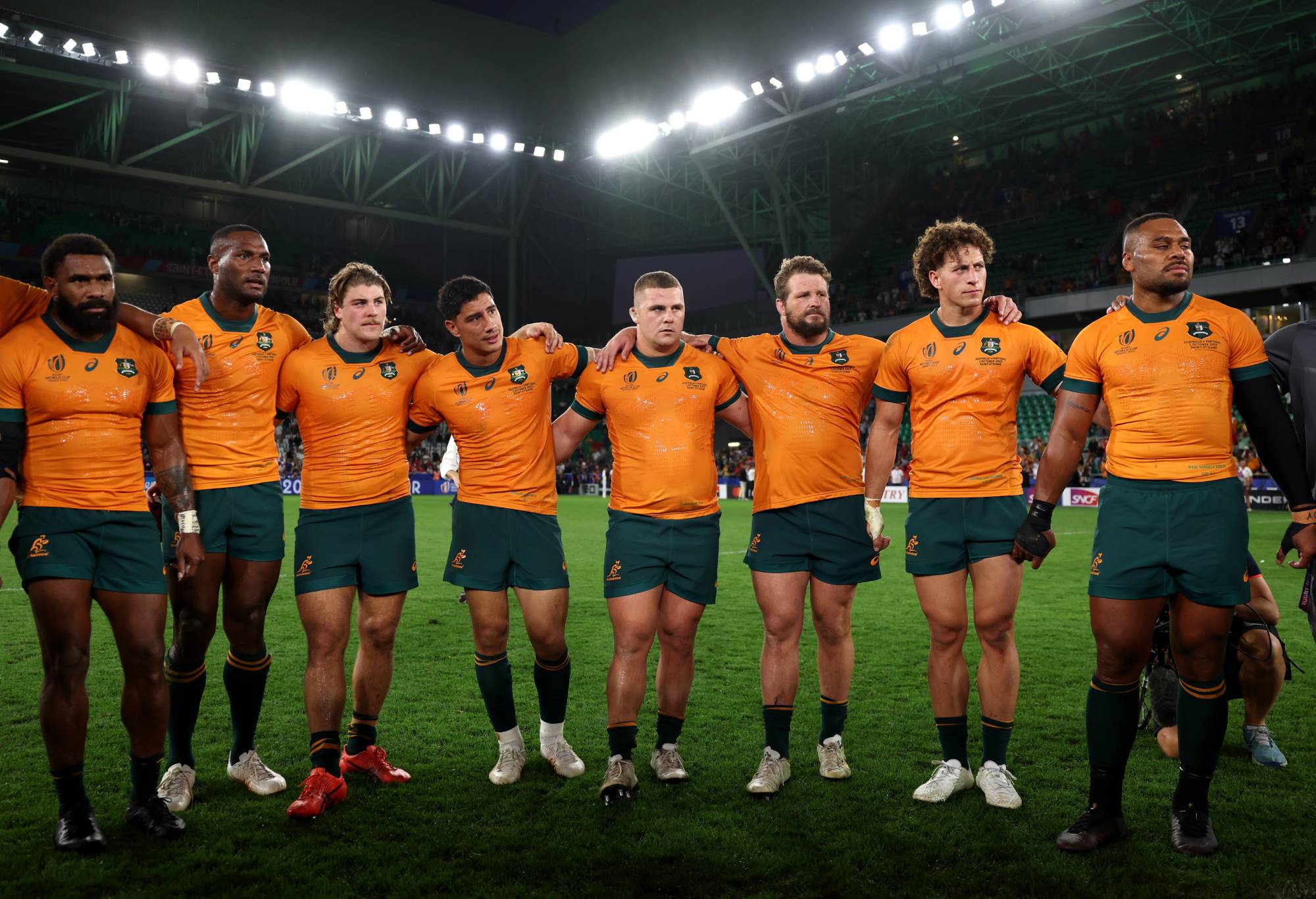
(Photo by Chris Hyde/Getty Images)
Every one of the eight teams who made it this year were integral across in the best quarterfinals ever seen in the Cup. Wales breathed fire, Fiji scaled the long hill, England rolled slowly, inexorably, Argentina sang their song, and the top four crashed into each other in successive Paris nights which will live forever in our apex rugby dreams.
Even if Ireland and France bowed out to the more experienced campaigners of the South, they were antagonists of the highest order. They are in the story. Their names appear in the credits as the film ends.
Score three tries on a Nienaber defence in a half? Take a bow and go to Australia in 2027 with serious intent.
Put together 37 phases for the win with the clock gone against the All Blacks? You have your pub tales for the next 50 years, Peter O’Mahony.
The Irish curse continues but how sweet it will be when (not if) they overcome? The long story is the best. Now, Fiji has an argument for equity. Wales and Argentina have just as many tales of woe around funding and club leadership and economic conditions, but they will revere the class of 2023.
England were happier with a coach they understood and believed in; even if the tries did not flow easily, they took the eventual champion to the wire.
Australia must always qualify and should always expect a semifinal as the pass mark for the World Cup.
When hosting, multiply the pressure. England in 2015; meet Australia 2027. Welcome to stress.
What can Aussie rugby take from each quarter-finalist in France?
Fiji: Fix the Flaws First
Simon Raiwalui is on the save-scrum side of the debate: he is not in league with the depower segment. For decades the brief to survive and defeat Pacific teams was simple: absorb the hits, smother a few offloads, wait for the penalties and drops, maybe a card, and use scrum and maul to pull away in the end. Year after year, this was the formula.
What did Fiji do? Get better at the “Fijian Way?” No. Fiji was honest and looked at their flaws to fix.
Fiji had one of the four best scrums in the competition. They mauled and defended the maul exceptionally well; better than several quarterfinalists and far better than the Wallabies. They kicked not just for contest but for field position and within the context of the match.
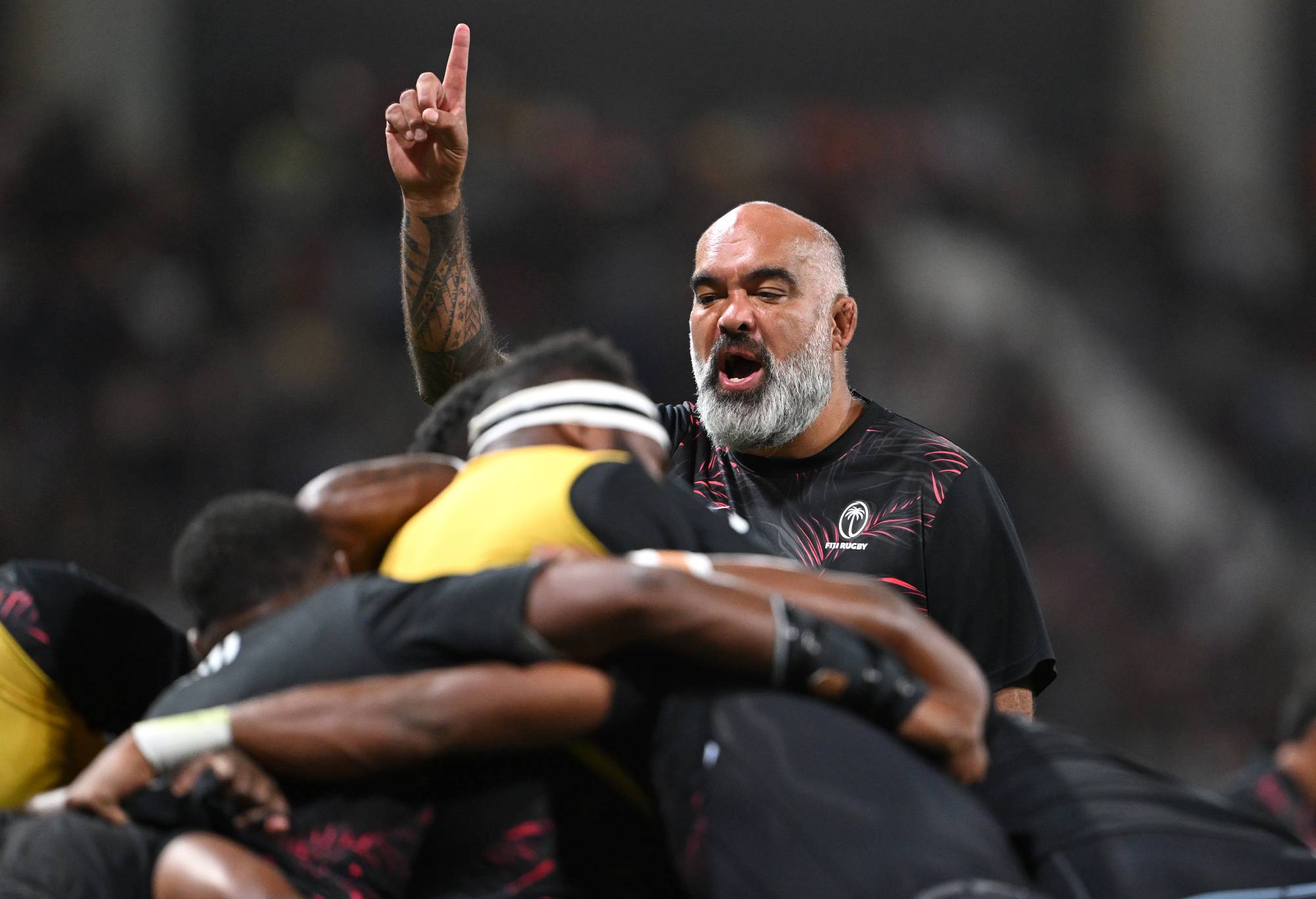
Simon Raiwalui. (Photo by Stu Forster/Getty Images)
Yes, they used new blood but had an experienced core: their prior World Cup caps was in the top eight.
Their flyers flew, but they fixed their flaws: game management, set piece, late game fitness, and ref communications.
Their camp was among the happiest in France: these players would have marched over broken glass into hell and back for their beloved coach.
The Wallabies are carded too much, are inaccurate at the ruck clean, lack time management in close matches, are not referee favourites, and do lag the best teams in strength and conditioning even if they fielded the largest pack in the competition, with game breakers wasted.
Wales: Keep it Simple
If Warren Gatland were a knight at the round table, he would not have imagined dragons. He is Captain Obvious but obvious truths can be good places to start when building a castle or a bridge, or a Rugby World Cup campaign.
The elder statesmen were allowed to retire on their own terms with their own Instagram explanations, and young firebrand, tackle monster Jac Morgan and slippery Saracen Nick Tompkins, led the new wave, but the team was still designed around deep experience: spicy-tongued Dan Biggar, bantamweight Liam Williams (who created 3 crucial tries and made 46 carries into the buzzsaw), battleship George North (320 minutes), super finisher Josh Adams, and until he broke a limb, Taulupe Faletau’s superb 287 minutes with 38 carries into contact, committing two tacklers 65 percent of the time.
Will Rowlands was their best ruck forward (he hit 67 rucks and was 92.5% effective) and added 70 big tackles as well.
Six Nations rugby it was. Wales kept their attack tight 15.4% of the time: the narrowest of the last eight.
They began the tournament by making 253 tackles: the most ever completed in any World Cup match. Yet there they were five matches later in the quarters, just undone by the exceptions to their philosophy. A leaky lineout losing four throws, two scrums undone, and a young playmaker throwing it to an old.
Gareth Anscombe was the perfect backup for Biggar, but cruelly was out for the knockout match.
But the lesson remains: even a short-time coach with losing clubs to draw from and no Giteau Law to save him can put a good camp in, preach a simple sermon and knock the Wallabies out. What Wales did, the Wallabies can do just a bit better.
England: Brexit
England exited their own 22 very well. Only 4.8% of their attempts to exit failed, behind only Argentina. Australia was booted out by England in 2019 because of poor exit practices. This time they were just behind Italy, with more than 10% of their exits stymied. This heaps pressure on a team.
Steve Borthwick knew his team, having been in the first mate’s chair in Japan, and part of that knowledge told him not to dally in the red zone.
On attack, his team kept it tighter than any other quarter-finalist than Wales; and went wide the least.
This is important for Australia to absorb because the team which went wider than the second receiver the least in this tournament was the Wallabies (3.5% versus Ireland’s 20.9%). Four years seems like an age but it is not enough time to wholly reinvent the DNA of the core of a squad. Australia is closer to England’s style than Ireland’s.
Start by exiting cleanly, long, and by the boot. Pick the moments to deviate from that, judiciously.
Argentina: Hire a Bouncer
Marcos Kremer made 92 tackles in 531 minutes; most of them in the trenches. He turned carriers over, he stopped momentum, he stole the ball, and a tenth of his attempts were game changers.
Also, he looks like menace incarnate.
By the way, he carried the ball 59 times into contact and won the collisions; committing two tacklers three times out of four.
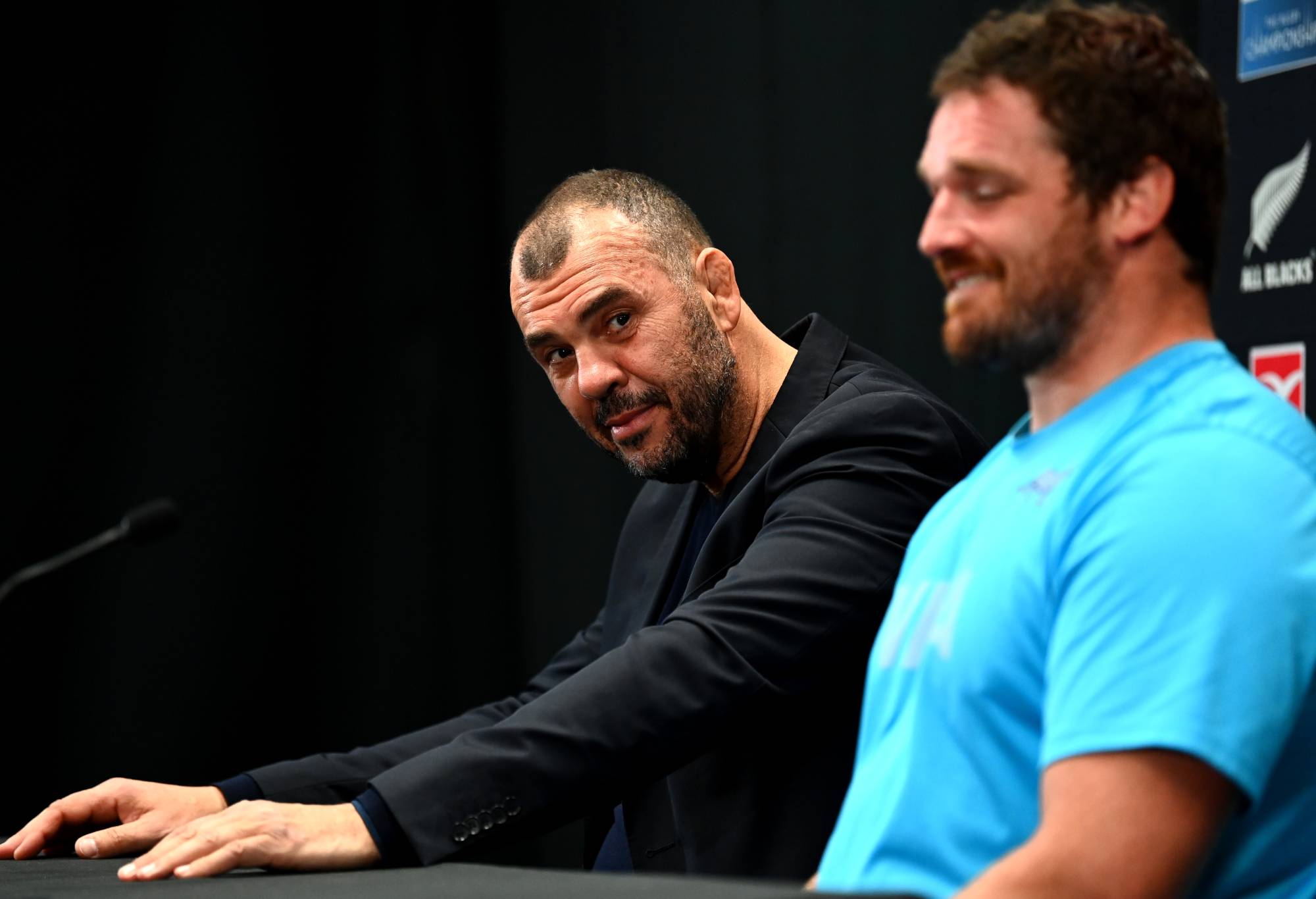
Head coach Michael Cheika and Julian Montoya. (Photo by Hannah Peters/Getty Images)
Plus, he hit 189 attacking rucks. That is not a typo.
He took the Pumas to Paris and the closing weekend. When his mate Pablo Matera went down, Kremer amped it up.
Blindsides were determinative in many cases this time: Pieter-Steph du Toit famously ruled the final, Peter O’Mahony and Courtney Lawes were as abrasive as ever, and Morgan punched above his weight.
The Wallabies put too much on Tom Hooper’s wide but rather slender shoulders. He played six hours of rugby, carried 23 times, hit 56 rucks, made no steals or turnovers, and attended 21 opponent rucks with miniscule effect. This is not a critique of Hooper Junior. He was a terrific tourist.
But he did not scare any Fijian, Welsh or Georgian.
Rugby is still the refuge of Kremer types: a channel for our rage, the last man you want to see.
Ireland: Finish your Breaks
If the All Blacks could have brought in an imaginary backs bomb squad of three to win the second half of the final, they might have chosen a set which had three Kiwis named Lowe, Gibson-Park and Aki.
Ireland led the tournament in finishing their line breaks with a try: almost 48% of the time. They were most successful at using offloads to create a break (23.4% of their offloads led to breaks) or a try.
Part of this is how quickly they got the ball to the wings, one of whom is from Canberra.
No team played to third receiver plus more than Ireland: 21% of their attacks got to the edge through at least two sets of hands.
Given that two of the Wallabies’ most crucial carriers are wings (Marika Koroibete and Mark Nawaqanitawase) and others wait “in the wings,” this does seem like a change in style both necessary and possible in four years.
This points out the value of players like Quade Cooper and Len Ikitau, who set speed free.
France: Do Not Depend on One
Antoine Dupont is a classy halfback. Despite having won only one Six Nations trophy during a relatively weak era (England and Wales declined) he has won three Player of the Championships. He has played in two French teams which exited in the quarter-finals of the Rugby World Cup.
He plays his position a bit differently than the more classic passmaster Aaron Smith; he kicks the exits, steers the attack more than his flyhalves,
He has played 26 of his 47 Tests against Scotland, Wales, Italy and Tier Two teams; his record against the Springboks is just one of four, and versus Ireland, he is a home winner only.
None of this is to undermine his skillset. He is a bigger, stronger, faster, and calmer Faf de Klerk, who currently holds the trophy which sat in Paris on offer and was supposed to be Dupont’s. Similar to the Bok nine, he flies into contact, but more on attack than defence.
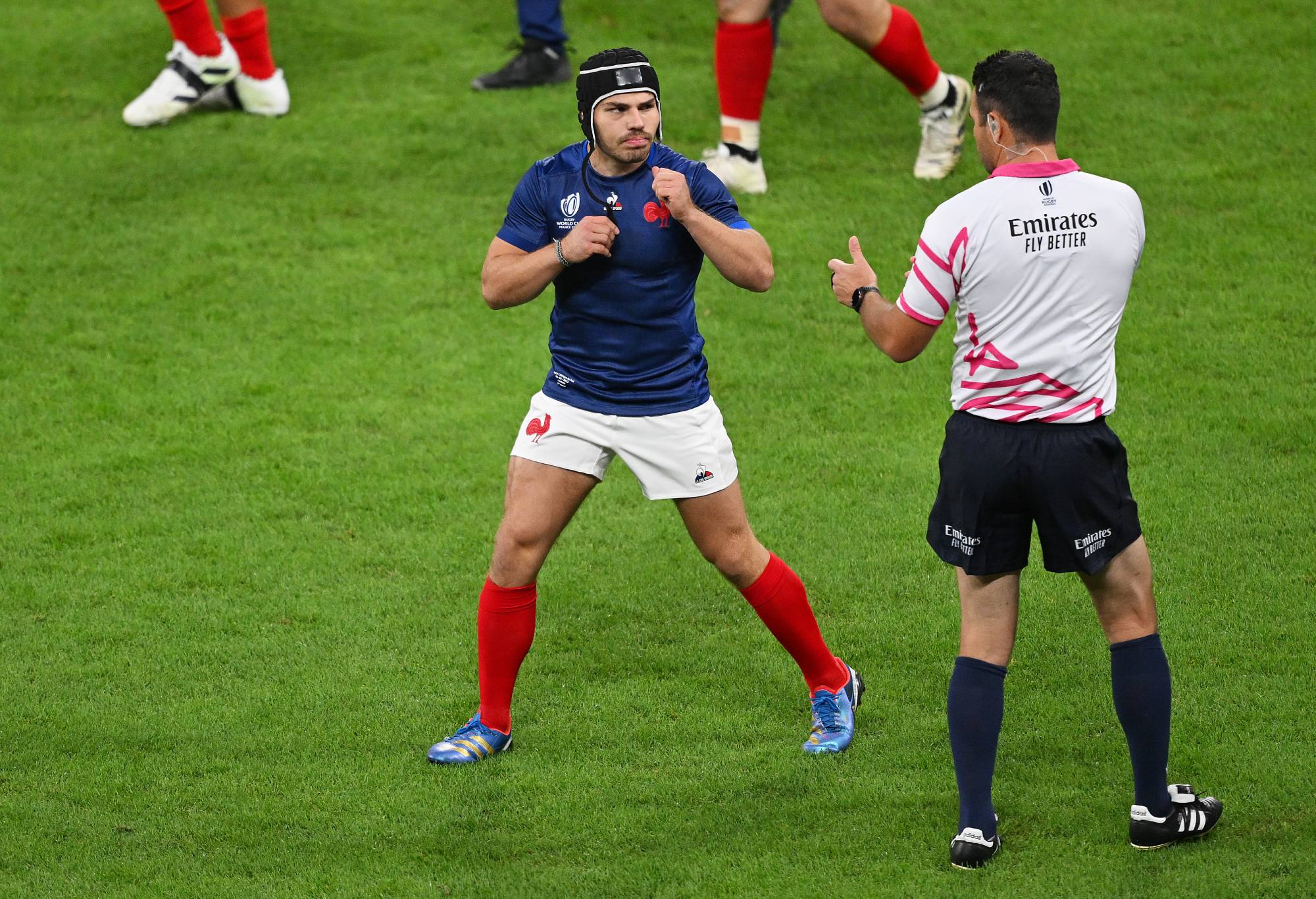
Antoine Dupont of France interacts with Referee Ben O’Keeffe during the Rugby World Cup France 2023 Quarter Final match between France and South Africa at Stade de France on October 15, 2023 in Paris, France. (Photo by Hannah Peters/Getty Images)
But too much of the French system runs through him, and he is tackled too much: at the base, in channel one, and by blindsides and locks and inside centres. When he is caught, he gets hurt.
As we all know, heaven and earth was moved to get him back to the quarter-final of all quarter-finals. He played all eighty-one minutes, passed the ball 76 times (with over ten of them wobblers or behind optimum placement), kicked 13 times but was not able to get back to the catch zone on the returns, and looked to be running on fumes in the second half.
Maxime Lucu was never brought on. He threw 75 passes during the entire Cup, one less than Dupont in the final match. But he was never caught at the base.
France has wonderful scrumhalves in the Top 14, including 44-cap Baptiste Serin of Toulon.
Dupont should never have been on the pitch against Namibia for one second longer than needed to get a gallop and should have played a smart role if he was there. Too much depended on him.
As the Wallabies build towards 2027, the focus must be on two and three-deep positional depth charts, and a game plan which does not depend on “get it to Izzy” or “Skelton is down; we are out.”
New Zealand: Do Not Get Carded
The All Blacks had two chances at a try (and succeeded the second time by a slender call which many a referee would have also rubbed out as forward in the air before it bounced forward as well) and two chances on the tee to take the match; having survived two oddities (Siya Kolisi not giving it and Kurt-Lee Arendse not grounding it).
Red cards do not end matches. We have dozens of examples to the contrary, and a good one in this tournament between two of the semifinalists. Particularly when the non-carded team then gets two cards, one for the final phases, the early card is hardly dispositive.
But, just as an injury to your only hooker in the second minute, it makes things hard.
Lost in the debate about whether Sam Cane deserved a red card (we should probably admit if Owen Farrell did the same thing, catching head with the upright tackle blow, it would not be contentious; also, Kolisi did not hit the head, that whiplash was secondary in nature) is that habits are engrained before the knockout matches and seem to come back at an inopportune time.
New Zealand and Fiji were the only quarterfinalists to have five yellow cards (joining Chile, Samoa and Romania) and were tied with Namibia for red card leadership.
Seven cards in seven matches is not an anomaly.
Rather than remonstrate and focus on the Cane Card (I am a regular listener to three New Zealand podcasts and each spent the first 20-odd minutes speaking only of injustice rather than simply congratulating the victor for overcoming their own set of obstacles) the focus of another often-carded team, Australia, should be on how to avoid it in 2027.
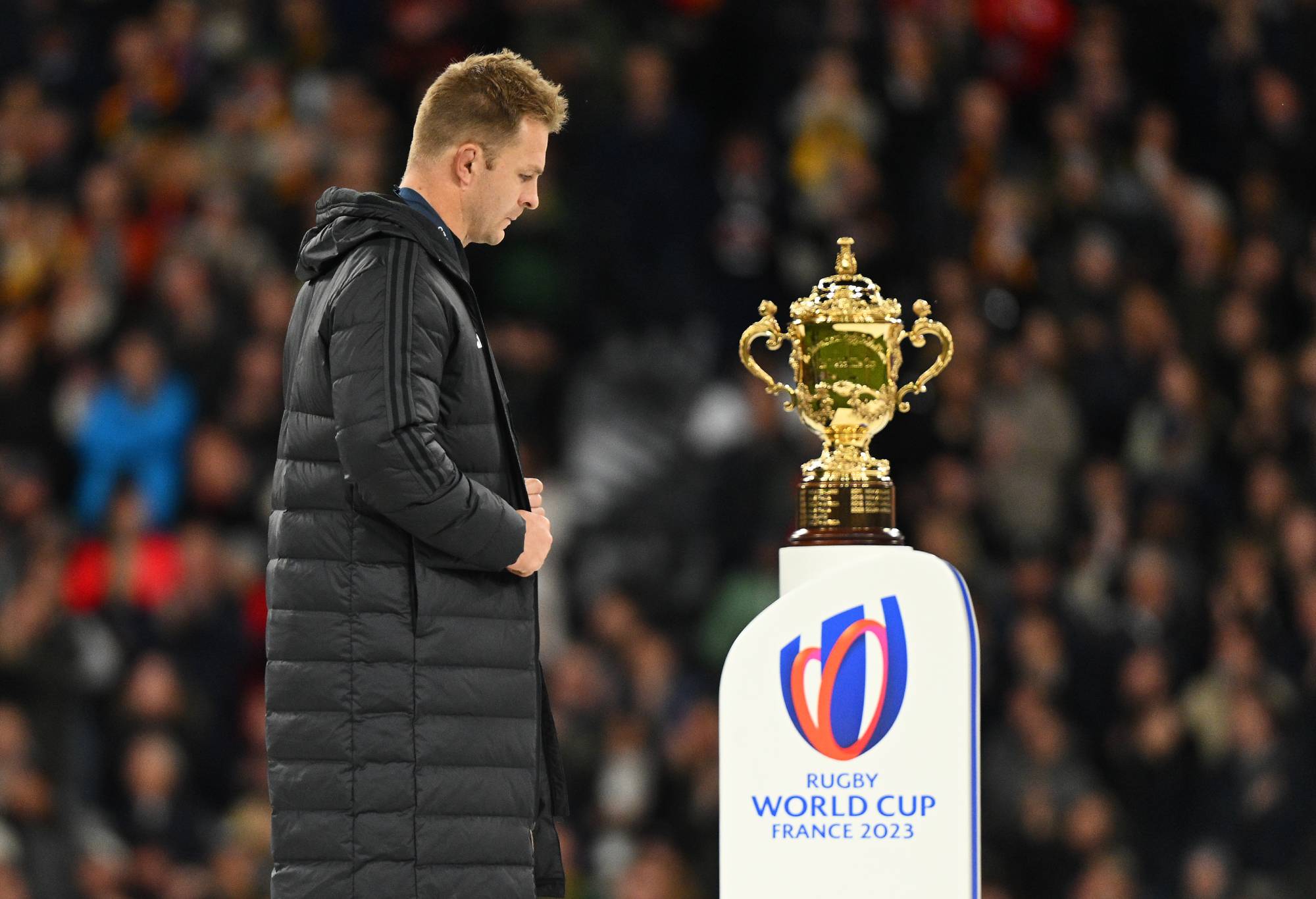
Sam Cane of New Zealand walks past the The Webb Ellis Cup following the Rugby World Cup Final match between New Zealand and South Africa at Stade de France on October 28, 2023 in Paris, France. (Photo by David Ramos – World Rugby/World Rugby via Getty Images)
This will take four years: four years of kinetics, patterns, habits, accuracy, and honesty.
Bernard Lewis, the late scholar who wrote so presciently on the Middle East, made the point that there are two basic ways in which people and nations respond to adversity. The first is to ask “who did this to us” which leads to self-pity, disavowing personal responsibility, and the second is “what did we do wrong?” which leads to success, after my own corollary query: “who can we copy?”
The next Wallaby coaching staff should copy the world champions who until the final were not often carded, and for years have been among the lowest in penalties and lowest in tackle height.
Pieter-Steph du Toit, Eben Etzebeth and Franco Mostert are not small men, but they bend players in half because they bend at the hips and use their glutes and thighs to drive into the ribs and lower.
It is not too dramatic to say that accuracy in contact, whilst retaining the force, is one of the top priorities for Australian rugby.
South Africa: Be Mean Like Ali
Muhammad Ali was funny. He could take punishment. He had heart. But he was not nice.
He found his opponents’ weaknesses and outlasted them, even if it sometimes appeared he was losing.
His confidence in himself was unshakable. This often came off as childish or churlish.
He did not need to win each exchange or the early rounds. He was blessed with certain gifts: vision and speed and reach, but he knew boxing was more mental than physical when it was time for the belt.
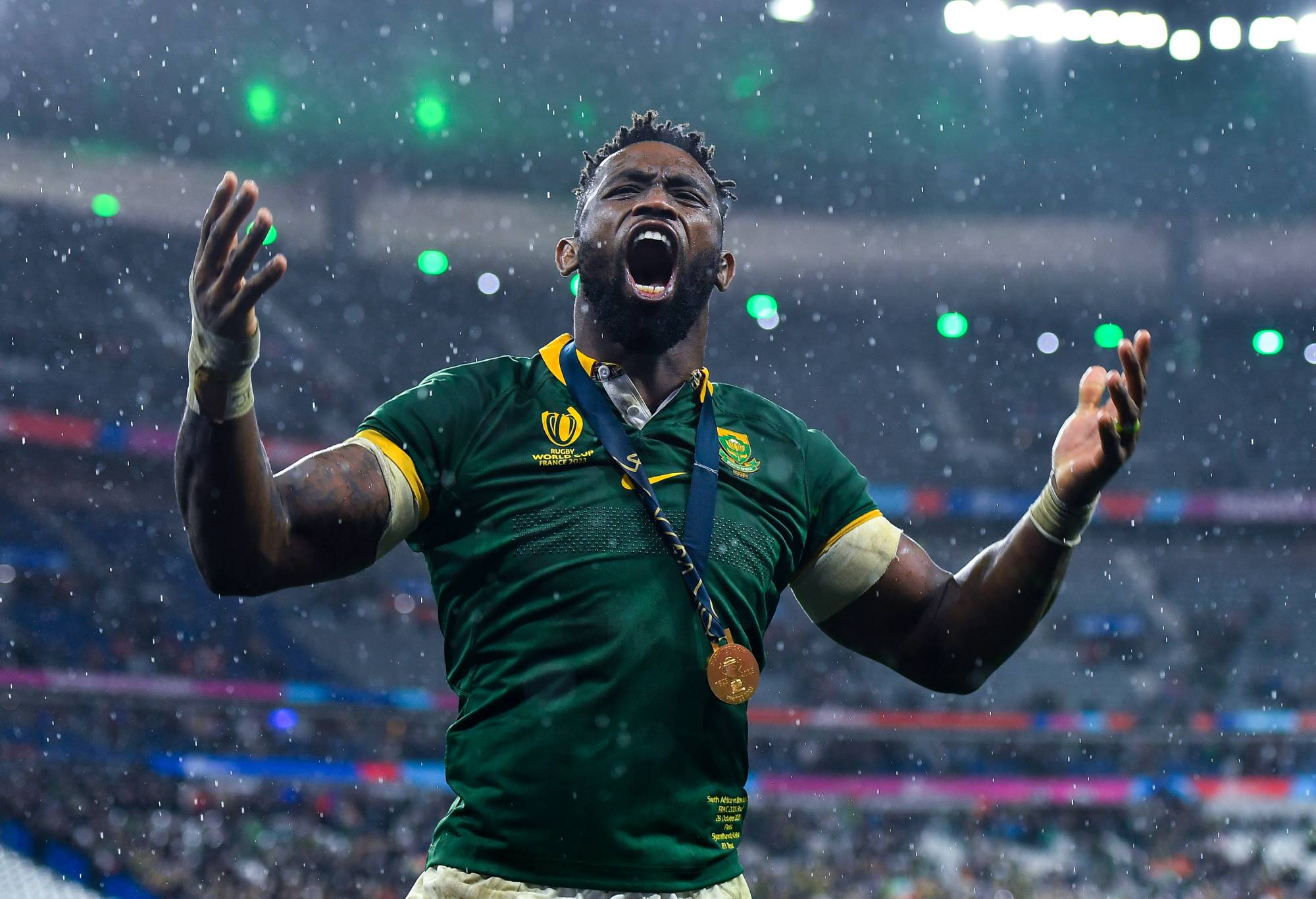
South Africa’s Siya Kolisi celebrates at full-time after winning Rugby’s world cup. (Photo by Franco Arland/Getty Images)
He was a master of the psych out.
He was not the greatest boxer of all time. He lost five times, even to Leon Spinks. His style was hard on his body; his health. His rope-a-dope was like being on dope.
He was hated by much of the establishment for being brash and a rebel; but in the end, not so many.
He was knocked down four times, but never knocked out.
Australia’s erstwhile coach Eddie Jones was right about only one thing: winning requires a hard edge. Jones sawed off the generational players most likely to be ruthless in close games, whilst Rassie Erasmus and Jacques Nienaber had only Kurt-Lee Arendse as a newbie to start the final and a couple on the bench.
The Wallabies need to learn that winning is its own thing, and it does not always feel nice, but in the end, it creates legends.


































































































